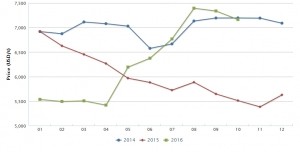China direct
Chinese sweetener prices rising at last after spate of plant closures

The ex-works price for ace-K, a calorie-free sugar substitute, hit US$7,163 per tonne in October—up almost 30% in 12 months during a period that saw the commodity’s lowest prices in two years.
“The [reduced] supply of ace-K due to production suspension from major ace-K manufacturers in China supported the price rise from April-August,” said Yang Yimin, editor of Sweeteners China News, which is produced by analyst CCM.
China’s ace-K market has shown sizeable fluctuations since February 2015, when key manufacturer Suzhou Hope, with a capacity of 10,000 tonnes per annum filed for bankruptcy. Though reorganisation allowed the company to resume production in late 2015, its shipments have been small.
Suzhou Hope was not alone in disrupting the market with raw material suppliers also suspending production. In April, Jiangsu Tiancheng, which manufacturers 20% of China’s diketene (DK), suspended production, while in July, Wanglong, with a DK production capacity of 70,000 tonnes, ended its supply. Both companies are yet to resume manufacturing the ingredient.
According to CCM’s research, the combined DK production capacity of these companies accounts for over 70% of China’s needs, leading to tight DK supply and supporting the rising price of ace-K.
“Seeing the suspension of ace-K-related producers, the oligarch ace-K manufacturer, Anhui Jinhe, also raised the quotation in order to make more profits,” said Yang.
Chinese manufacturers feature heavily in word supply, with Suzhou Hope, Beijing Vitasweet joining leader Anhui Jinhe as significant manufacturers, followed by Germany’s Nutrinova.
At over four times the size of Nutrinova, Anhui Jinhe has a significant say on prices due to its “oligarch” status. As the world’s biggest manufacturer, Anhui Jinhe delivered over 7,000 tonnes in the first three quarters of 2016, accounting for some 40% of orders.
Yet as its competitor Suzhou Hope has not yet withdrawn from the business, Anhui Jinhe is not expected to raise its prices too fast, CCM says, leading to some stability in the short-run, as recent ace-K prices have shown.
In April, the leader lifted its ace-K prices by US$298.4 per tonne to capitalise on the rising price trend.
Current global ace-K demand is in the region of 15,000-18,000 tonnes per year, just met by production capacity of around 20,000 tonnes per year.
More stories from China…
WeChat joins Starbucks with gifting and mobile payment platform
Starbucks has partnered with Chinese online and app giant Tencent Holdings to create a new social gifting feature on WeChat, China’s leading mobile social communications service.
The service, which will launch in the New Year, positions Starbucks as the first retail brand to bring a social gifting and digital payment to WeChat in China.
Tapping into the 846m active user accounts, the feature will allow customers to send Starbucks products to others as gifts.
“Just as Starbucks cards are among the most gifted around the globe, we aspire to also become the most gifted brand digitally in China,” said Belinda Wong, Starbucks China’s chief executive.
As part of the partnership, Starbucks will also introduce WeChat Pay for sales in its mainland China retail stores. The cash-free service, which uses mobile devices to make digital payments, is one of the most popular merchant methods in China. More than 300m users have linked their bank cards with WeChat or QQ, another Tencent service.
Chinese kids taller and fatter than ever before
Young people in China have become taller and fatter due to better living standards and changing lifestyles.
An official report found that the average 18-year-old Chinese male now stands 2cm taller than he did in 2000, while girls of the same age have grown by 1cm.
At the same time, obesity among urban males aged 7-22 increased by a factor of 25 between 1985 and 2014 to 15%, whereas those in rural areas increased 45-fold. Girls haven’t grown in weight as fast, with young female obesity growing 1,2500% in both rural and urban areas.
"That Chinese youth are getting taller is simply because living standards have been improving," said Liao Wenke, a Ministry of Education official.
"Meanwhile, the problems of obesity… have a lot to do with lack of exercise, which is associated with the heavy study burden and changing lifestyle, such as the popularisation of electronic devices at an early age," Liao said.
Young people are also less fit than in the 1980s, with a “fear of using up study time” given as the top reason for students not to engage in sports. More than 30% of those aged 13 to 15 reported having such concerns.
Due to China’s recently abolished single-child policy, many children are often spoiled and self-centred, and also tend to be lonely, the study also found.







